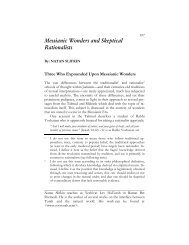Is There a Disconnect between Torah Learning and ... - Hakirah.org
Is There a Disconnect between Torah Learning and ... - Hakirah.org
Is There a Disconnect between Torah Learning and ... - Hakirah.org
Create successful ePaper yourself
Turn your PDF publications into a flip-book with our unique Google optimized e-Paper software.
12 : Hạkirah, the Flatbush Journal of Jewish Law <strong>and</strong> Thought<br />
A friend of mine was davening with a minyan at Lud airport. The<br />
people leading the minyan took every possible opportunity to say a<br />
Kaddish, adding Kaddeishim after almost every paragraph of tefilah<br />
after the Shemona Esrei. After עלינו a yeshiva man approached one<br />
of the minyan <strong>org</strong>anizers <strong>and</strong> said to him, “You know, the Aruch<br />
HaShulchan writes that it is not right to add Kaddeishim<br />
superfluously. The man heard the yeshiva man out respectfully. But<br />
חיים exclaimed, when he was finished, he turned to his friend <strong>and</strong><br />
Kaddish!”) (Chaim, he said a d’var <strong>Torah</strong>; הוא אמר דבר תורה–קדיש !<br />
In a previous article in this journal 3 I repeated a story told by Rav<br />
Reuven Feinstein "א in which one of his talmidim who had<br />
accidentally broken a borrowed tape recorder claimed that he did not<br />
have to pay for the damage because “it was an accident.” Reb Reuven<br />
was astounded that the boy did not connect the incident to his<br />
studies. He was learning קיד <strong>and</strong> surely knew that a שואל was<br />
responsible to pay for accidental damages to a borrowed ,חייב באונסין<br />
object. When Reb Reuven shlit”a asked Reb Moshe ztz”l how this<br />
disconnect <strong>between</strong> learning <strong>and</strong> behavior could happen, Reb Moshe<br />
told him that when בחורים learn halachos in Gemara <strong>and</strong> then witness<br />
those halachos not being adhered to in their community, they learn<br />
that what they were taught in Gemara is דוקא ,לאו not necessarily so.<br />
They then fail to apply their learning to life, thus disconnecting their<br />
learning from their lives.<br />
While this “disconnect” exists in many areas, I believe it is most<br />
starkly evident in the area of middos <strong>and</strong> דרך ארץ (character traits as<br />
expressed in one’s manners, demeanor, <strong>and</strong> behavior).<br />
פרק המפ<br />
שליט<br />
In the ever-stranger list of reasons for declining a shidduch<br />
(perspective bride), I heard one recently that truly shocked me. A<br />
young man declined to meet a girl because she had only one<br />
sibling, <strong>and</strong> he “was afraid of getting stuck with eventually having<br />
to take care of elderly parents.” He wanted to go into a family with<br />
more siblings who would help share the load.<br />
I don’t know this young man’s family history <strong>and</strong> what<br />
experiences he may have had that prompted this approach to<br />
shidduchim, but to me this is a level of selfishness, accompanied by a<br />
3 Fried, Aharon H., “Are Our Children Too Worldly?” <strong>Hakirah</strong>, Vol. 4,<br />
Winter 2007, pp. 37–67.
















